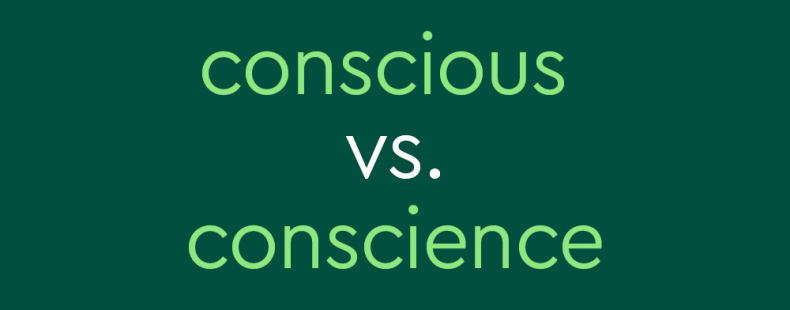Conscience vs. conscious is a classic question of vocabulary, spelling, and pronunciation. If you’re anything like us, you have to think very hard each time you spell or say each word—and double check if you’re using the right one.
Luckily, we can provide some tricks and examples that will not only help you remember how to say and spell each word, but also help you to keep them straight from now on. Stick around to the end and quiz yourself to see if you’re really conscious of the difference!
⚡ Quick summary
Conscience [ kon-shuhns ] is a noun that refers to a person’s inner sense of right and wrong. Conscious [ kon-shuhs ] is an adjective meaning aware or, more literally, awake—as in the opposite of unconscious. Like many other adjectives, conscious ends in -ous. In contrast, conscience has the noun ending -ence—to remember its spelling, picture it as a combination of con- and science.
Is it conscious or conscience?
To determine the right choice in terms of conscious vs. conscience, first think about what each word means.
Conscience [ kon-shuhns ] is a noun that refers to a person’s inner sense of right and wrong—the feeling you get that tells you whether or not you’re doing the right thing.
Conscious [ kon-shuhs ] is an adjective whose most literal sense means awake or having full mental faculties (i.e. not unconscious), as in You will be fully conscious during the operation. It is also often used to mean fully aware of or sensitive to something, as in I’m conscious of my shortcomings or Be conscious of your surroundings. Sometimes, it means intentional, as in It was a conscious choice. It has other shades of meaning, but they all involve intention or awareness.
The noun form is consciousness. The word subconscious can be a noun referring to a person’s underlying mental state—all the mental activities they’re not fully aware of. It can also be an adjective used to describe things related to a person’s subconscious, as in subconscious desires.
Because subconscious can be a noun and it involves a mental state, be careful not to confuse it with conscience.
How do you spell conscience and conscious?
The ending -ence is a good reminder that conscience is a noun. The –ence ending is used in nouns like sentence, difference, and, importantly, science. To remember the spelling of conscience, picture it as a combination of con- and science (it can even help to pronounce it that way in your head to get the spelling right). The con- prefix comes from a word meaning “with,” so remember: conscience should always be spelled with science.
Conscious starts out the same as conscience, but, like many of its fellow adjectives, it ends with the popular adjective ending -ous.
Examples of conscience and conscious used in a sentence
Take a look at these example sentences with conscience and conscious to get a better idea of how the words are used and how they’re different.
- None of the bad things he does seem to bother him—it’s like he has no conscience at all.
- I feel like I have to serve as the company’s conscience sometimes.
- She bumped her head really hard, but luckily she managed to stay conscious.
- She was not conscious of the reputation that followed her, nor was she aware of the traits that contributed to it.
- It was a conscious decision—it was made with full knowledge of the consequences.
- I’m especially conscious of my conscience when it’s telling me I’m wrong.
Take the quiz: do you know when to use conscience and conscious?
After reviewing these words, you can’t in good conscience skip our short quiz on when to use these two words! Stay alert and you’ll pass it easily.














